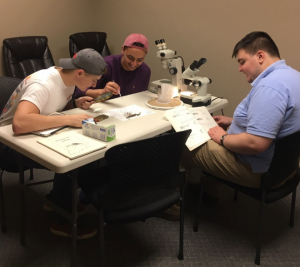
William Borland ’22 — My name is William Borland, and for the past eight weeks, I have been an intern at the Montgomery County Health Department. My responsibilities in the office have included the continued development of the Drug-Free Montgomery County (DFMC) website, as well as designated driver and “brew”-master for the vector control unit known as the SWAT (Surveillance of Water and Airborne Transmitters) team. With these roles, I was able to contribute to the pursuit of general health and welfare for the populace of Montgomery County.
One of the responsibilities as an intern at the MCHD is the SWAT team. As interns, our job was to regularly set traps that attracted insects with a special mixture of alfalfa and water that, to the bane of man and beast alike, reeks something awful. Caught mosquitos were labeled to the best of our ability and sent to the Indiana State Department of Health to be tested for various pathogens such as West Nile Virus, Malaria, and Chikungunya. The responsibilities of the SWAT team are an example of how the health department is on the front lines of prevention; the goal is to prevent the spread of infectious diseases rather than mosquito eradication.
My chief role, the development of the DFMC website, has a very similar purpose: prevention. Substance abuse is a topic that is readily discussed and researched, but resources are spread out over the expanses of the internet and tucked away in corners not regularly accessed by the community. My job was primarily to find resources for prevention/education, treatment, and recovery to compile onto an easy to navigate and centralized website. This way, all the services from Montgomery County, the state of Indiana, and the nation, can be easily accessible and easily distributed. The hope that Samantha (the intern coordinator) and I share is that the site will be a tool for emergency responders, law enforcement, and citizens alike to use to combat the ever-growing epidemic that is substance abuse.
My experiences at the MCHD have given me a much broader understanding of public health, and a deeper respect for it. I think a good analogy for the role of public health is to describe the health department as the offense, and any sort of practiced medicine as the defense. When thinking about community welfare and health, we tend to think about the short-term solutions, like getting treated for an infection or dehydration. What we don’t see are the underlying causes of these problems. We don’t see or think about the malfunctioning septic systems or lack of running water. We don’t see these same people working two to three jobs just to stay afloat, and not having the time or the strength to take care of home responsibilities. All of these things are just a portion of what is on the docket for the health department every day. The health department is the offense that provides resources, pushes inspections to identify disparities in living conditions, advocates for correct construction and facilities development and upkeep, and for the monitoring and eradication of hotspots that could lead to communicable diseases from mosquitos. All of these things are done under the radar to improve the quality of life for the citizens of Montgomery county. As we like to say, a good offense is the best defense, and the health department is the offense that works for the community.
Thank you to the Wabash Global Health Initiative for providing the funds and opportunity for me to experience the workings of a prime example of public health at work. I know the goings-on of this summer will contribute heavily as I look to find what my life will lead and am grateful for the lessons and conversations had along the way.